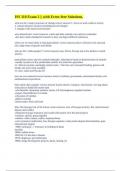ISS 310 Exam 2 || with Error-free Solutions.
what are the 3 major processes of change correct answers 1. forces at work within a society
2. contact between societies (including forced change)
3. change in the natural environment
why domesticate? correct answers -cattle and other animals can easily be controlled
-also have multi-chambered stomach so they can digest difficult substances
where are we most likely to find pastoralism? correct answers places with poor soil, seasonal
rain, large areas of grasses and shrubs
who are the "cattle-peoples"? correct answers asia, Africa, Europe and a few herders in north
america
pastoralism correct answers animal husbandry, subsistence based on domestication of animals
-usually in places of low predictable rainfall, not suited for agriculture
ex: African savanna: seemingly useless land--> flat clay soil, seasonal flooding, grasses and
shrubs, but more food available
ex: nuer, sudan and Navajo,US
how are we connected correct answers trinity of military government, international banks, and
multinational corporations
belo monte dam complex correct answers brazils electric company, electronorte, moving ahead
with plans to build belo monte dam
-who benefits: aluminum smelters, mines, GE Westinghouse supplied turbines
-impact: flood 400 km^2 of lands
-relocation of families
-global warming
current status: back and forth
film, The Kayapo Out of the Forest correct answers -loss of Kayapo territory, life, and increased
disease and conflict
-illustrates Kayapo resistance and world wide protest over the dam projects
-tradition: speech, group together
-modern: video camera, radios, airplanes/boats
-corn ceremony=unification, how Kayapo organize, make points despite discrimination, gain
international support
-1989: turning pt--> resistance to building of dams
timeline:
1800s=rubber boom
1900-50=1/2 die due to disease
1970s=highways and settlements
1980s=mega development projects, dams, mining, etc
, whats the role of anthropology when dealing with the dams? correct answers to document how
indigenous people take the risks and do not get the benefits of the mine
-advocate for indigenous people
OK TEDI mine correct answers one of the largest open pit copper mines in the world
-affecting indigenous peoples of Papua new guinea
-alter landscape, water erosion, and toxic mining waste
-move to crowded villages, wage labor, men in mines while women are in gardens and
prostitution, child malnutrition, malaria
downstream yonggom group--> cyanide spill, toxic runoff, went to court to protest
who is robbins correct answers he isnt an anthropologist, his main theory is political ecology
institution correct answers society wide web of roles and norms set up to meet a need or a goal
(education, law, family, etc)
-formal laws and social norms
-most common property is managed through institutions instead of coercion or privatization
what did robbins book say about controlling carbon? correct answers it doesnt stay in one place,
emissions come from a set of locations, but the impacts are shared by all UNEVENLY
-the benefits of carbon emission reductions are also unevenly distributed
what is kyoto protocol? correct answers -it was in 1997 and was an institutional attempt to
address the greenhouse effect
-wasnt mandatory
-attempted to set national limits on carbon emissions
-didnt say how to do this or enforce it
-US withdrew saying it was a failure, while 37 others stayed
what is the prisoners dilemma? correct answers theoretical game in which a particular action
would benefit all, but individuals behaving selfishly will create a situation that isnt optimal for
everyone
whats the tragedy of the commons (via ted ed)? correct answers -nicholas amendolare (Ted-ed in
2017)
-humans are built from self interest and PERSONAL gain
-"commons" is a shared limited resource
what did Garrett Hardin (1968) say about the tragedy of the commons? correct answers -
theorized the tragedy of the commons as a particular type of prisoner's dilemma
pasture ex:
-everyone has access to a commonly help pasture
-no rules about sustainable numbers for grazing
-each herder benefits more from adding more animals than they lose from overgrazing (self
benefit)




